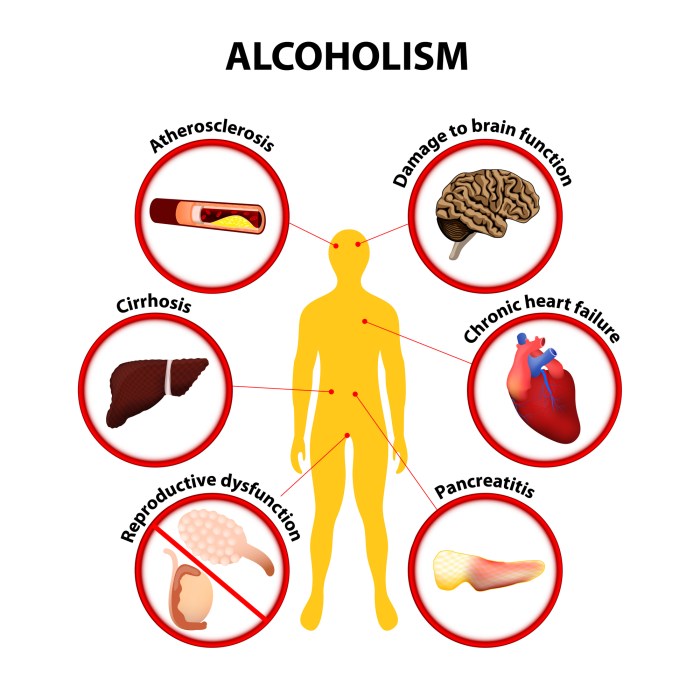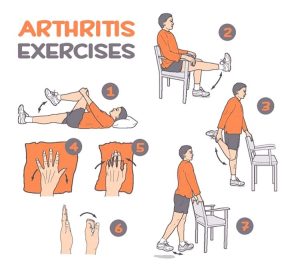
Starting with the importance of avoiding smoking and excessive alcohol for bone health, this topic sheds light on the detrimental effects these habits can have on bone density and overall well-being. In a society where such habits are prevalent, understanding the impact on bone health is essential for making informed choices.
As we delve deeper into the discussion, we uncover the intricate relationship between lifestyle choices, bone health, and the role of wellness programs in fostering better habits and stronger bones.
Importance of avoiding smoking and excessive alcohol for bone health
Smoking and excessive alcohol consumption can have detrimental effects on bone health. These unhealthy habits can lead to decreased bone density and increase the risk of fractures and osteoporosis. It is crucial to understand the impact of these lifestyle choices on our bones and take steps to avoid them for better skeletal health.
Effects of Smoking on Bone Health
Smoking has been linked to a decrease in bone density and an increased risk of fractures. The harmful chemicals in cigarettes can disrupt the balance of bone remodeling, leading to weaker bones over time. Research has shown that smokers have a higher likelihood of developing osteoporosis compared to non-smokers.
It is essential to quit smoking to protect bone health and reduce the risk of bone-related diseases.
Effects of Excessive Alcohol Consumption on Bone Density
Excessive alcohol consumption can also have negative effects on bone density. Alcohol interferes with the body’s ability to absorb calcium, an essential nutrient for bone health. Chronic alcohol abuse can lead to decreased bone mass and an increased risk of fractures.
It is important to limit alcohol intake and maintain a balanced diet rich in calcium and other nutrients to support bone strength.
Importance of Lifestyle Choices in Maintaining Strong Bones
Lifestyle choices play a significant role in maintaining strong and healthy bones. Regular exercise, a balanced diet, and avoiding harmful habits like smoking and excessive alcohol consumption are essential for bone health. By making positive lifestyle choices, individuals can reduce the risk of bone-related conditions and ensure better skeletal strength as they age.
Wellness Programs

Wellness programs play a crucial role in promoting overall health and well-being, including bone health. These programs typically consist of a variety of components aimed at improving physical, mental, and emotional health.
Components of a Comprehensive Wellness Program
- Regular physical activity: Including weight-bearing exercises that are beneficial for bone strength and density.
- Healthy diet: Rich in calcium, vitamin D, and other nutrients essential for bone health.
- Stress management: Techniques like meditation and yoga can help reduce stress levels, which can impact bone health.
- Health screenings: Regular check-ups to monitor bone density and detect any issues early on.
- Education and awareness: Providing information on the importance of bone health and how lifestyle choices can impact it.
Role of Wellness Programs in Promoting Bone Health
Wellness programs are instrumental in promoting bone health by encouraging individuals to adopt healthy habits that support strong bones. By incorporating specific initiatives targeting bone health, these programs can help raise awareness and provide resources for maintaining optimal bone density and strength.
Examples of Wellness Initiatives for Bone Health
- Workshops on bone-healthy nutrition and cooking demonstrations.
- Group fitness classes focusing on weight-bearing exercises.
- On-site bone density screenings for employees.
- Smoking cessation programs to help individuals quit smoking and reduce the risk of bone-related issues.
Participating in Wellness Programs to Avoid Unhealthy Habits
Engaging in wellness programs can serve as a positive outlet for individuals looking to avoid unhealthy habits like smoking and excessive alcohol consumption. These programs offer support, resources, and a sense of community that can help individuals make healthier choices and reduce the risk of bone-related complications associated with these habits.
Herbal Remedies
Herbal remedies have been used for centuries to promote bone health and strengthen bones. These natural alternatives provide a holistic approach to maintaining strong and healthy bones.
Beneficial Herbal Remedies for Bone Health
- Nettle: Nettle is rich in calcium, magnesium, and other minerals essential for bone health. It helps in improving bone density and reducing the risk of osteoporosis.
- Horsetail: Horsetail is a herb known for its high silica content, which is crucial for the formation of collagen in bones. It supports bone growth and repair.
- Red Clover: Red clover contains isoflavones that can help in preventing bone loss and maintaining bone strength, especially in postmenopausal women.
Traditional Uses of Herbs in Maintaining Strong Bones
- Herbs like alfalfa, dandelion, and oat straw have been traditionally used to support bone health and overall well-being.
- These herbs are believed to aid in mineral absorption, reduce inflammation, and provide necessary nutrients for bone strength.
Scientific Evidence Supporting Herbal Remedies for Bone Density
- Studies have shown that herbs like nettle and horsetail can contribute to increased bone mineral density and reduce the risk of fractures.
- Research suggests that the phytoestrogens in red clover can help in preserving bone mass and preventing bone loss associated with aging.
Precautions when Using Herbal Remedies for Bone Health
- Consult with a healthcare provider or herbalist before incorporating herbal remedies into your routine, especially if you are on medication or have underlying health conditions.
- Avoid exceeding recommended doses of herbal supplements as they can have side effects or interact with other medications.
- Be aware of potential allergies or sensitivities to certain herbs and discontinue use if you experience any adverse reactions.
Skin Health: Importance Of Avoiding Smoking And Excessive Alcohol For Bone Health

Maintaining good skin health is not only important for appearance but also plays a crucial role in supporting overall bone health. The connection between bone health and skin health may not be immediately obvious, but they are both influenced by similar lifestyle choices.Smoking and excessive alcohol consumption can have detrimental effects on both skin and bone health.
These habits can lead to premature aging of the skin, decreased collagen production, and impaired wound healing. In terms of bone health, smoking and alcohol can interfere with the absorption of calcium and other essential nutrients, leading to weaker bones and increased risk of fractures.To support overall bone health, it is essential to prioritize good skin care practices.
Here are some tips for maintaining good skin health that can indirectly benefit bone density:
Skincare Routines for Healthy Skin and Bones
- Avoid smoking and limit alcohol consumption to protect both your skin and bones.
- Stay hydrated by drinking plenty of water to keep your skin and bones hydrated.
- Eat a balanced diet rich in fruits, vegetables, and lean proteins to provide essential nutrients for skin and bone health.
- Use sunscreen daily to protect your skin from harmful UV rays, which can accelerate skin aging and affect bone health.
- Incorporate regular exercise into your routine to improve circulation, promote collagen production, and support bone density.
- Get an adequate amount of sleep to allow your skin and bones to repair and regenerate during the night.
Bone Density
Bone density refers to the amount of mineral content present in bone tissue, which determines its strength and overall health. Maintaining healthy bone density is crucial for preventing fractures and osteoporosis, especially as we age.
Factors Influencing Bone Density
- Calcium Intake: Adequate calcium consumption is essential for building and maintaining strong bones.
- Vitamin D Levels: Vitamin D helps the body absorb calcium and plays a vital role in bone health.
- Physical Activity: Weight-bearing exercises, such as walking, running, and weightlifting, help stimulate bone growth and maintain bone density.
- Hormonal Balance: Hormones like estrogen and testosterone play a significant role in bone density maintenance.
- Lifestyle Choices: Avoiding smoking and limiting alcohol intake can help prevent bone loss and maintain healthy bone density.
Avoiding Smoking and Excessive Alcohol for Bone Health, Importance of avoiding smoking and excessive alcohol for bone health
Smoking has been linked to decreased bone density and an increased risk of fractures, while excessive alcohol consumption can interfere with calcium absorption and bone formation. By avoiding smoking and limiting alcohol intake, individuals can significantly reduce their risk of developing osteoporosis and other bone-related issues.
Strategies to Improve Bone Density
- Ensure an adequate intake of calcium and vitamin D through diet or supplements.
- Engage in regular weight-bearing exercises, such as walking, dancing, or strength training.
- Avoid smoking and limit alcohol consumption to support bone health.
- Consult with a healthcare provider for bone density testing and personalized recommendations.
Muscle Mass
Maintaining a healthy muscle mass is crucial for overall bone health as muscles provide support and protection to the bones in our body. The relationship between muscle mass and bone health is symbiotic, as strong muscles help to reduce the risk of fractures and improve bone density.Excessive alcohol consumption and smoking can have detrimental effects on muscle mass and bone strength.
Alcohol interferes with the production of muscle protein, leading to muscle weakness and decreased muscle mass. Smoking, on the other hand, reduces blood flow to the muscles and bones, impairing their ability to repair and regenerate.
Role of Muscle-Building Exercises
Muscle-building exercises play a significant role in promoting bone health by stimulating the production of new bone tissue and improving overall bone density. These exercises help to strengthen the muscles, which in turn support and protect the bones from injury.
- Weightlifting: Resistance training with weights or resistance bands helps to increase muscle mass and improve bone strength.
- Bodyweight exercises: Activities like push-ups, squats, and lunges can help build muscle mass and enhance bone health.
- Yoga: Practicing yoga poses that engage multiple muscle groups can improve muscle strength and flexibility, benefiting bone health.
Final Thoughts
In conclusion, prioritizing bone health by steering clear of smoking and excessive alcohol is a proactive step towards maintaining strong and resilient bones. By making informed choices and embracing healthier habits, individuals can safeguard their bone density and overall well-being for years to come.
Quick FAQs
How does smoking affect bone health?
Smoking weakens bones by reducing blood flow to the bones and decreasing the absorption of calcium, leading to lower bone density.
What are some herbal remedies beneficial for bone health?
Herbs like nettle, horsetail, and red clover are known for their bone-strengthening properties and can help improve bone density.
Can excessive alcohol consumption impact bone density?
Yes, excessive alcohol can interfere with the balance of calcium and other minerals in the body, leading to decreased bone density over time.






